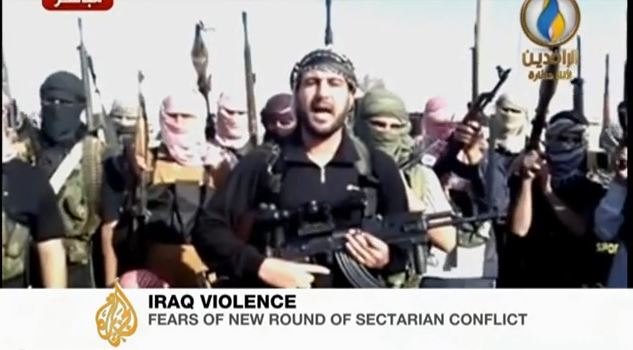Militants in Iraq show their readiness to fight on May 18, 2013. (Al-Jazeera)
Estimation and outlook on the situation in Syria and the region – Part 5
Iraq heating up
Iraq is the most uncertain variable in any current estimation.
Conflicts are heating up in the country again, and gains of Sunnite fighters in Syria have given Sunnites in Iraq motivation to act against the Shiite government of Prime Minister Nouri al-Maliki, by which they feel being discriminated against.
Iraq has the longest border with Syria of all neighbouring countries, running from Turkey to Jordan. With the US not anymore in position to play into internal Iraqi politics, the international community is fearful of future developments in Iraq.
Assad in place to save the region
We think this is one major reason why Syria´s other neighbours as well as international and regional powers have come to the conclusion better not to remove Syrian President Bashar al-Assad at the moment. Such move would in all likelihood create the biggest failed region worldwide, in case Iraq seriously drifts back into war.
Assad may be hated by many. But his security apparatus and army together with their regional and international aides are the only bulwark standing between a still limited-to-Syria war and a frightening prospect of a whole region on fire.
Devastating dynamics
Once Assad is gone and remaining state structures with him, a giant conflict zone could open up that may not only destabilize this part of the world, but also serve to export terror, especially to European capitals and Western interests in the Middle East.
Not to mention, such dynamics could threaten Israel in its very existence, when – under public pressure – a window of opportunity for Egypt and Jordan may open up to cure the old humiliating wounds. Compared to what could happen then, the ten-year-long Iraq war may retrospectively look like an easy warm-up.
U.S. moves out – Russia moves in
The U.S. can´t and wont got back to Iraq, and of course not to Syria. U.S. President Barack Obama is facing multiple constraints: lack of money to finance such a huge endeavour, cuts in the military sector, domestic and voter resistance (people are glad the “boys” are finally back home; what are we doing there?) and strategical refocusing on the Pacific region and China, away from Europe and the Mediterranean.
Russia is already moving into those voids: in Europe since long with gas exports, and in the Middle East rapidly now with support for Syrian President Bashar al-Assad and a far reaching diplomacy of cold war dimensions. It is Russia´s golden opportunity to build a balance of power in at least a part of the world.
Nobody wants to take the baton
The U.S. engagement in Iraq was more than humble, not to speak of a failure. The long-term consequences are still uncertain and will play out in the years to come. What´s happening now in Syria is already one of them, one might argue.
There is no other power in the world that has nearly as much capacities at its disposal as the U.S. Given the recent American record in Iraq, it can be said with confidence that no other big power is going to dare a similar adventure in Syria.
Assad given free hand
This is why we think the international community will – in one way or the other – agree to contain the situation by giving President Bashar al-Assad a relatively free hand in order to ward off a bigger disaster in the region.
Time is playing into Assad´s hands. Regional and international actors know that, and it seems – contrarily to public statements – apart from the humanitarian situation they are not totally unsatisfied with developments they see on the ground.
This is an estimation of possible future developments that we anticipate.

